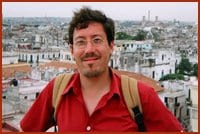Ottawa audiences will be treated to the city’s first queer film festival in years, thanks to the initiative of a prominent former member of the city’s arts community.
Jason St-Laurent is the programming director at Toronto’s annual queer film festival, Inside Out, having left the SAW family six months ago.
He’s already hatched the idea of launching a satellite festival in Ottawa. With the success of Toronto’s fest, now in its 17th year, he says he thought it was time that Ottawa had one of its own.
“Besides the Pride Festival, in terms of queer culture in Ottawa, things have been pretty slim, aside from some social events and parties. This is something that has been missing from the landscape for quite a while now. It means a lot in terms of bringing in films you just won’t see otherwise,” says St-Laurent.
In late July, an open forum was held at Club SAW to gather community opinion and see if there was support for St-Laurent’s idea of branching out from Toronto’s Inside Out and holding a version of the festival in Ottawa. Enthusiasm for the idea amongst the queer community seems to be strong, judging from the results of the forum. Ken Mews, executive director of Pink Triangle Services, attended the opinion-gathering event, and says his organization is fully behind the initiative. He sees it as a vital event for the community, he says.
“Telling our stories, and seeing images of ourselves, and our role models and heroes, our anguish, our aspirations and our joys reflected in film is a very important part of building a community,” Mews says.
“I think it’s a two-way thing,” he continues. ‘[A queer film festival] provides models for members of the community who are interested in film to imagine that they can do something that reflects their own lives. On the other hand, it contributes to the community a way of understanding the reality that they’re living every day of their lives, and that’s not reflected in the mainstream film and video world. So it’s important that there should be a stage on which this kind of expression is exhibited.”
St-Laurent took the minutes from the Jul 22 forum to the 10 members of the Inside Out board of directors, who later approved the idea in a majority vote.
Ottawa is the only major Canadian city without such an event since the demise of former film fest Making Scenes, nearly four years ago. That festival disappeared amidst rumours of mismanaged funds and soaring debt, and despite several attempts, there has been nothing to fill the gap it left, until now.
This year’s pilot edition of the festival will be a trial run of sorts, says St-Laurent. If all goes well, then the fest would expand the following year.
“We want to ensure that this succeeds, because we don’t just want this to be a pilot initiative, we want this to be an ongoing relationship with Ottawa. So, to ensure that success, what we want to do is bring the best of queer cinema from the past year. The best documentaries, the best feature films, the best shorts, the prize winners, the critically acclaimed works — blow Ottawa away on the first try. I want to revive something that people have been wanting for a long time.”
The films will roll in late October, and the festival will run for three or four days, says St. Laurent. It will include thrice-daily screenings and a swank opening night party. The Canadian Film Institute has also agreed to come on board for the project, so the screenings will be held at the Library And Archives Of Canada, a 300-seat venue.
An advisory committee has already been struck to help ensure a smooth roll-out for the fest. Peter Honeywell, the executive director of the Council For The Arts In Ottawa, has signed on to act as administrative advisor. He says he thinks the fest will be a success, provided it is managed correctly.
“I don’t believe in deficits,” says Honeywell. He recalls that Making Scenes was well received by the community, with lineups extending around the block for screenings. Since then, he says, “there has been a vacuum in Ottawa, and film is a popular medium. I think the festival will work because the Ottawa community has shown support for alternative film.”
St-Laurent points out that such a festival is one of the only means of showcasing queer media on a larger scale. He says that chain cinemas, and even television, are still resistant to queer programming, despite the perception that progress has been made in that area.
“There’s a general misconception that queer media has hit the mainstream. I would totally argue with that,” says St-Laurent. “Out of the 276 films that we played at our festival, I know of two feature films that are being distributed widely, out of all of those features. There’s still a need for this type of platform for queer artists and queer filmmakers, because popular media’s still not there yet.”

 Why you can trust Xtra
Why you can trust Xtra


